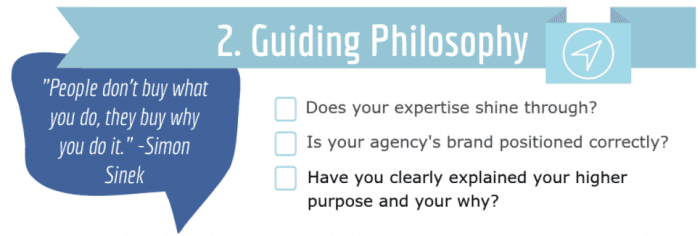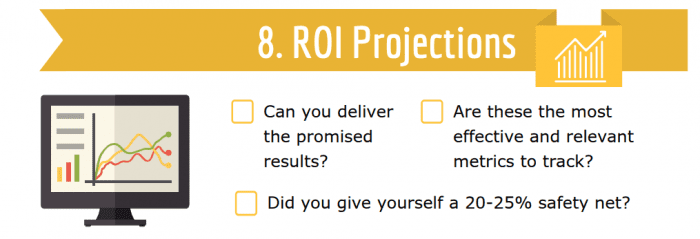Stop slaving over custom proposals that lead you down dead-end roads. Instead, start with a proposal that’s already 90% to completion for every prospect. You will save time, create happier clients and close bigger deals
How?
It starts with a template.
That’s right. Similar to your email template, or your newsletter template, or your website template. It’s the same concept, you start with a basic, proven framework and you add what you need and take away what you don’t. You’ll be finished in half the time and you’ll win three times the deals.
Download Digital Agency Coach's proposal template to help push your proposal in the right direction. Keep reading to find out how to maximize the template and get every last drop of value out of it. Before you submit it make sure you run it by our Ultimate Digital Agency Proposal Checklist to make sure you’re submitting only the creme-de-la-creme of proposals.
The Ultimate Digital Agency Proposal
Overview
If you’re dealing with bigger companies you may never meet the decision makers who read your proposal. So this overview should be treated like your first impression and you want to make sure you wow them and stand out! So don’t be another “Agency Proposal” in the stack, instead, dazzle them with a “Triple Your Traffic Plan.”
Remember, you only have a couple minutes to wow them so you want to do it fast. Overview the entire plan but focus on the ultimate goal. It’s important to keep this section simple, this isn’t the time for specifications or technical terminology. Instead, hype them up! Get them excited to do this awesome project with your awesome agency. Hook them so they’re excited to read more into it. Of course, make sure your contact information on this page. If you make contacting you as easy as possible for them then they’ll be more likely to do so.
Overview Checklist:
- Does your proposals name give insight into what it’s about?
- Is your logo and contact information easily accessible?
- Are their logo and brand apparent at first glance?
- Does the overview hook the reader?
Guiding Philosophy
Alright, so if the reader has made it to this point then you hooked them! Now it’s time to sell yourself, you’ve got to justify why they should care about what you have to say. Your professionalism and expertise should shine through, but this section is really about your higher purpose.
We’ve all heard the Simon Sinek golden circle talk, “People don’t buy what you do they buy why you do it.”
So this is your chance to explain your why. Take your purpose statement, mission statement, core values, and unique selling proposition and wow them. Remember the decision maker may have no clue who your agency is, so you need to spell it out for them.
Guiding Philosophy Checklist:
- Have you clearly explained your higher purpose and your why?
- Is your agency’s brand positioned correctly?
- Does your expertise shine through?

Definitions
Remember you’re the expert in the field and they’re hiring you because they’re not! So all of that technical jargon could make you seem smart but it will most likely just confuse them and we all know if you confuse them you lose them! By adding a definition section you’re breaking down communication barriers and you’re building value.
This section is especially important if the prospect is unsure of your services. If they understand what they’re investing in they’ll be more likely to actually follow through. If they know all of the terms they can skip it but those who need it will appreciate it more than you know.
Definitions Checklist:
- Do the definitions reflect industry norms?
- Are all necessary terms defined?
- Will someone outside of your industry be able to understand your proposal?
Target Audience
A lot of proposals seem like a great plan but they leave the reader wondering, “Is it a good plan for MY business?” Including a target audience section will squash this objection. If you accurately describe their target audience then the prospect will know this plan was created with their needs and audience in mind.
An easy way to increase perceived value in this section is to simply create a customer avatar. Take the market research you’ve already done and plug it into a customer avatar template. This will definitely help your proposal stick out from the rest.
Target Audience Checklist:
- Have you done proper market research?
- Did you create a customer avatar?
Existing Assets
If you’re in a specific niche you most likely encounter the same type of prospects, problems, and systems. So this section can be written out in your template and when it comes time to customize you can eliminate what doesn’t apply and add anything you missed. The most important aspect to focus on is bringing the pain.
People don’t like change and they won’t do it until the pain is so strong that they’re forced out of their comfort zone. So make sure they know that what they’re currently doing isn’t working and prove it. Include screenshots of 404 error pages, a dysfunctional mobile page, anything relevant. Then take that pain a step further and emphasize why it’s hurting them. Point out the negative effects it has on their Google rankings, the detrimental effects to their brand’s image, and all of the missed opportunities. If done properly the prospects will be itching for a solution after this section.
Existing Assets Checklist:
- Are you bringing the pain?
- Do you have proof to backup your claims?
- Will you be able to fix all of these issues?

Strategic Recommendations
Now that they’re in pain it's time to give them some hope, you should have been setting the stage so that your agency seems like the knight in shining armor. Begin to paint the big picture for the prospect and don’t be opposed to having a bullet point list with all of your objectives. Remember, they’re in pain after the last section so they need an easy to digest the solution. Presenting them with a “customized strategy” to remedy all of the previous pain points will get you that much closer to winning them over.
Strategic Recommendations:
- Were your solutions created with the customer avatar in mind?
- Are all recommendations feasible and achievable?
- Did you remedy every pain point from the previous sections?
Project Timeline
Now your prospect has hope that your agency can help them, and they’re probably ready to see how you plan to actually achieve everything you just laid out. It’s time to get more specific in your execution, explaining how the project will be broken up into phases and what those phases will look like. Skim over what’s going to happen and about how long it should take to complete. Make sure you give yourself wiggle room when it comes to the timeline, it's better to finish a project early than it is to deliver it late.
This section will be as specific as you get for how the project will run its course. A more detailed plan will come when it's time for the Project Scope Document but before you spend hours getting into all of those little details you need to get a commitment from the prospect. A good prospect will understand this and respect your time. If they don’t, run! They’ll be a problem client down the road.
Project Timeline Checklist:
- Do timeline projections have a 20-25% buffer?
- Do you have the service bandwidth to accomplish this project within the timeframe?
ROI Projections
ROI Projections may not apply or even be necessary for a lot of proposals but they can really take a proposal to the next level. Larger prospects will pay special attention to this section. The tricky part about ROI projections is that they’re a bit harder to figure out and they set the bar for the project. It’s crucial that you deliver on these numbers so give yourself a 20-25% safety projection. It’s better to underpromise and overdeliver than it is to fall short. ROI projections are more work and more risk but including this section truly helps position your agency as an investment, not an expense. When prospects see how great the return on investment is they’ll be chomping at the bit!
ROI Projections Checklist:
- Did you give yourself a 20-25% safety net?
- Can you deliver the promised results?
- Are these the most effective and relevant metrics to track?

Investment
At the end of the day, it all boils down to one thing: price. Hopefully, your prospects have read the entire proposal and understand how valuable your agency and services are. If they have then the price should seem like a steal even if you’re not the lowest offer in the stack.
You want to make sure that you are positioning the price as an investment in their future. Explain that there's an initial upfront capital investment then a significantly smaller monthly retainer fee, or whoever your pricing structure works. Then list out everything they’re going to get, and I mean everything. Seeing the laundry list of things you plan on accomplishing next to the price tag will only further justify it.
Investment Checklist:
- Is the project cost framed as an investment?
- Has your proposal built enough value to justify the price?
FAQ
This section is one so few people include but it's one of the most valuable sections of the entire proposal. The FAQs can alleviate common concerns and objections before they even arise. Even better, you’re able to craft an eloquent and valuable response instead of struggling to come up with something on the spot. Use this section to build value in your services, squash the competition, and put the prospect’s mind at east.
FAQ Checklist:
- Do you answer questions before they’re raised?
- Did you address all common concerns and objections?
- Do the answers build value in your agency and services?
Next Steps
Explaining how to proceed and what happens next means it will be much more likely to happen. People love it when you make things easy for them. So walk them through how to accept the proposal, including where to send it, and explain what starting the project will look like.
If necessary you can include your legal copy here. I have found this to be a barrier to entry so I prefer to handle it at a later time but make sure you’re following all industry guidelines and protecting your agency.
Next Steps Checklist:
- Did you explain the acceptance process?
- Is your contact information easy to find?

Executive Summary
The overview was your first impression and the executive summary may be your last, so make it count. It’s important to reiterate your dedication to their success and remind them why they really need you. Take this opportunity to bring the pain one last time and position your agency as the ultimate antidote. Lastly, professionally thank them for the opportunity.
Executive Summary Checklist:
- Does your professionalism shine through?
- Did you summarize the pain points?
- Does your agency seem like the perfect solution?
To help you, we've created an infographic to help you digest all the steps you need to take.

There you have it! This 12 part proposal is guaranteed to help you start closing bigger deals faster. Be sure to download our proposal template to get started. Then use this checklist to make sure it reaches its fullest potential for your agency. Customizing the template initially may take a little while but once it’s finished and you’re able to reuse it you will save yourself days of work. Now get to it!
Thanks to Lee Goff for sharing their advice and opinion in this post. Lee is CEO of
Marketing Agency Coach. You can connect with him on
LinkedIn.











